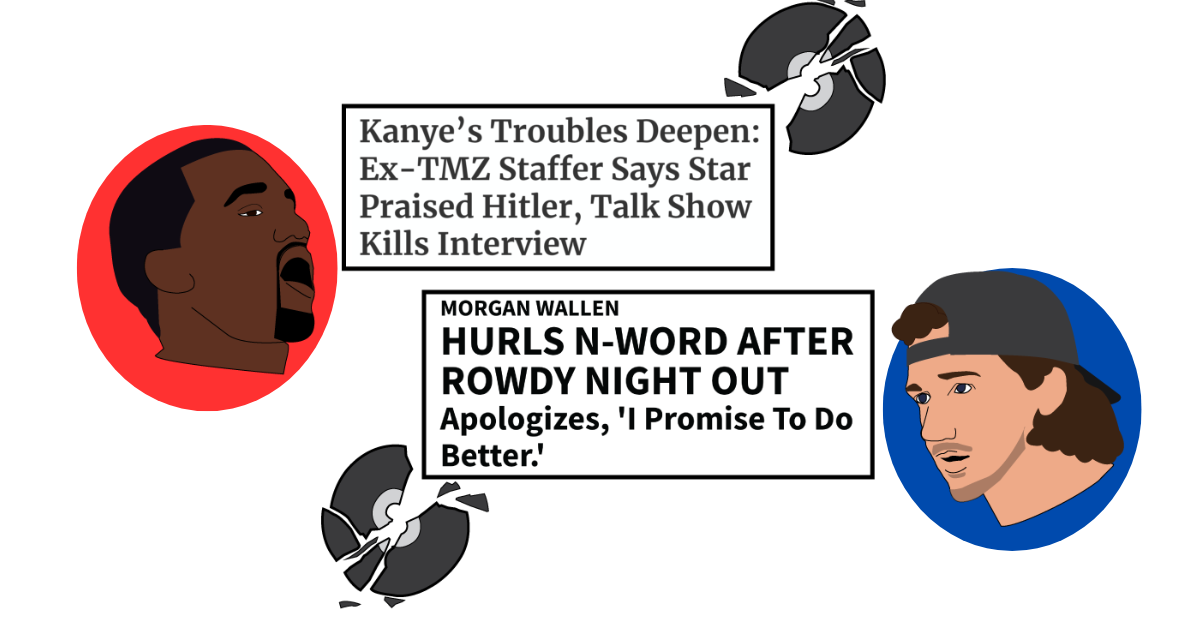Kanye West and Morgan Wallen are two of the biggest names in the music industry. Both, despite their contrasting genres and audiences, share a commonality: they made charged comments about race and ethnicity.
Most recently, West made antisemitic comments in interviews and has been under fire ever since. In a similar fashion, Wallen publicly used a racist, derogatory term on camera — which many have forgotten or ignored, despite the viral video.
Artists find themselves soaking up fame and seldom unearth corners of the world where the light does not envelop their every move. This emphasizes just how influential musical artists can be. However, many lack perspective and end up nurturing deeply rooted issues thanks to their thoughtless behaviors.
It is disappointing to see prominent people abuse their positions with such far-reaching platforms. These situations leave not just the artists, but also the fans, in a predicament.
Consumers must choose whether indulging in these artists’ work aligns with their values as supporting their work can indicate support for the individual. They must ask themselves this: do the artist’s wrongdoings outweigh the significance of their work?
Some may decide the artist was never what made the art they cherish so significant. Instead, the meaning they derive from the art itself is of greater magnitude than the issues at hand. This begs the question: do we, as a society, draw a line?
Picking out which artists’ work to support establishes an implicit disparity by creating piles of those we outcast and those we accept. It would be close to impossible to draw a firm “line,” considering the polarized society in which we live.
If every situation is treated the same, ethical obligations would depreciate. Drawing a line also implies the acceptance of some crimes or issues over others. Once we give the stamp of approval to one artist, we must give it to all. If consumers outcast West but accept Wallen, does that mean society accepts his controversial wrongdoings over others?
Listeners cannot allow musicians’ misconduct to fall through the cracks; they must be held accountable. Otherwise, the widespread negligence toward complex issues prevalent in the music industry will persevere, something that Wallen’s situation proved.
In the early months of 2021, Wallen was caught on camera using a racial slur. While he did receive backlash and radio stations stopped playing his music, fans continued to show their support. Wallen’s album sales escalated, setting records in the country music industry.
This is a prime example of how divided society has become. People are so willing to refute the rightful criticism of musicians that they will feed them money to prove a point. In the face of a progressive, ever-changing society, it is surprising to see such high tolerance for people who make music and spew a little bigotry on the side.
For a while, I thought it was okay to listen to problematic musicians. I claimed to be “separating the art from the artist” and “drawing meaning from the creation, not the creator.” In reality, I was contributing to a larger problem. By allowing a severance of the artist and their art, I was brushing past immorality. I continued to enable the abuse of platforms, reminiscent of Wallen’s most ardent fans in 2021.
Some argue that they are consuming art in a way that does not contribute to the artists’ income and thus are free of this unspoken obligation to society. However, consumption still gives life to their creations and, as a result, the creator.
It is too challenging to decide the weight of each crime and whether or not it falls into this “safe” category of consumption.
When you play the song “Bound 2” by West, do you think about the memories attached to the flowing beats and auto-tuned voices? Or do you remember the antisemitism that led to West becoming a pariah?
It is nearly impossible to detach a musician from their music. An artist’s name is attached to their work, and also attached to their name is their misconduct. I find it hard to believe that if you brought up West’s name to a friend, talk of antisemitism and conspiracy theories would not follow.
Exceptions enable standards to become malleable and the line of acceptance to blur. Just because Wallen’s “Wasted On You” got you through a tough time does not mean the residue of his comment has disappeared. We cannot make exceptions to allow these musicians to have such a chokehold on listeners that their harmful actions become a thing of the past. Everyone, regardless of their net worth, should be held accountable.






